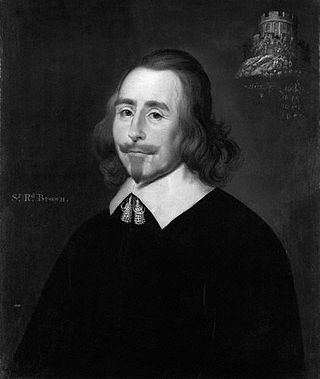Related Research Articles

Earl Grey is a title in the peerage of the United Kingdom. It was created in 1806 for General Charles Grey, 1st Baron Grey. In 1801, he was given the title Baron Grey of Howick in the County of Northumberland, and in 1806 he was created Viscount Howick in the County of Northumberland, at the same time as he was given the earldom. A member of the prominent Grey family of Northumberland, Earl Grey was the third son of Sir Henry Grey, 1st Baronet of Howick.

Earl of Chichester is a title that has been created three times, twice in the Peerage of England and once in the Peerage of the United Kingdom. The current title was created in the Peerage of the United Kingdom in 1801 for Thomas Pelham, 2nd Baron Pelham of Stanmer.

Earl of Strafford is a title that has been created three times in English and British history.

Baron Leigh has been created twice as a hereditary title, once in the Peerage of England and once in the Peerage of the United Kingdom. The first creation came in the Peerage of England 1643 when Sir Thomas Leigh, 2nd Baronet, was created Baron Leigh, of Stoneleigh in the County of Warwick. The Leigh Baronetcy, of Stoneleigh in the County of Warwick, had been created in 1611 for his grandfather and namesake Thomas Leigh. The latter was the second son of Sir Thomas Leigh, Lord Mayor of London in 1558, whose third son Sir William Leigh was the grandfather of Francis Leigh, 1st Earl of Chichester. The titles became extinct on the death of the fifth Baron Leigh in 1786.

There have been three baronetcies created for persons with the surname Booth, one in the Baronetage of England and two in the Baronetage of the United Kingdom. The 1916 creation remains extant, the 1835 creation became extinct in 1896 and the 1611 baronetcy has been dormant since 1797. The senior line of the first creation was elevated to the peerage as Baron Delamer and Earl of Warrington.

There have been ten baronetcies created for persons with the surname Browne, six in the Baronetage of Great Britain, three in the Baronetage of Ireland and one in the Baronetage of Nova Scotia. Only one creation is extant as of 2010. Three of the creations were for members of the Browne family headed by the Viscount Montagu.

There have been three baronetcies created for members of the Grey family, one in the Baronetage of England, one in the Baronetage of Great Britain and one in the Baronetage of the United Kingdom. Two of the creations are extant as of 2007.

Baron Grey of Werke (or Warke), of Chillingham in the County of Northumberland, was a title in the Peerage of England. It was created on 11 February 1624 for Sir William Grey, 1st Baronet. He had already been created a baronet, of Chillingham in the County of Northumberland, in the Baronetage of England on 15 June 1619. The third Baron was created Viscount Glendale and Earl of Tankerville in the Peerage of England in 1695. He left two daughters but no sons and on his death in 1701 the viscountcy and earldom became extinct. He was succeeded in the barony by his younger brother, the fourth Baron. The latter had previously represented Berwick in Parliament. The barony became extinct on his death in 1706.
There have been two baronetcies created for members of the Blackett family, both in the Baronetage of England. One creation is extant as of 2013. The Blackett family can be traced back to the Blacketts/Blakheveds of Woodcroft, County Durham, some of whom became highly successful in the lead and coal mining industries in Northumberland and County Durham.

Sir Edward Blackett, 2nd Baronet was an English landowner and politician who sat in the House of Commons at various times between 1689 and 1701.

There have been four baronetcies created for members of the ancient House of Beaumont, all in the Baronetage of England. All four creations are extinct or dormant.
There have been two baronetcies created for persons with the surname Pakington, one in the Baronetage of England and one in the Baronetage of the United Kingdom. One creation is extant as of 2008.
Sir Clobery Noel, 5th Baronet, of Kirkby Mallory, Leicestershire, was an English Tory politician who sat in the House of Commons from 1727 to 1734.
Sir William Wheler, 1st Baronet of the city of Westminster, was an English politician who sat in the House of Commons at various times between 1640 and 1660. He was knighted by the Lord Protector in 1657 and was made a baronet by King Charles II in 1660.

Sir Edward Mosley, 2nd Baronet, of Hulme, Lancashire, was an English politician who sat in the House of Commons from 1661 to 1665.
Heaton Castle in the parish of Cornhill-on-Tweed, Northumberland, England, is a ruined historic castle near the Scottish border.

Edward Noel, 1st Viscount Wentworth was a British peer.
Anne Lovelace, 7th Baroness Wentworth was an English peeress.
Sir John Wentworth, 1st Baronet, of Gosfield, Essex, was an English aristocrat.

Ralph Grey, 2nd Baron Grey of Werke was an English peer.
References
- ↑ Browne Willis Notitia parliamentaria, or, An history of the counties, cities, and boroughs in England and Wales: ... The whole extracted from mss. and printed evidences 1750 pp176-239
- 1 2 George Edward Cokayne Complete Baronetage, Volume 1
- ↑ George Edward Cokayne Complete Baronetage Volume 2 1900 Mosley